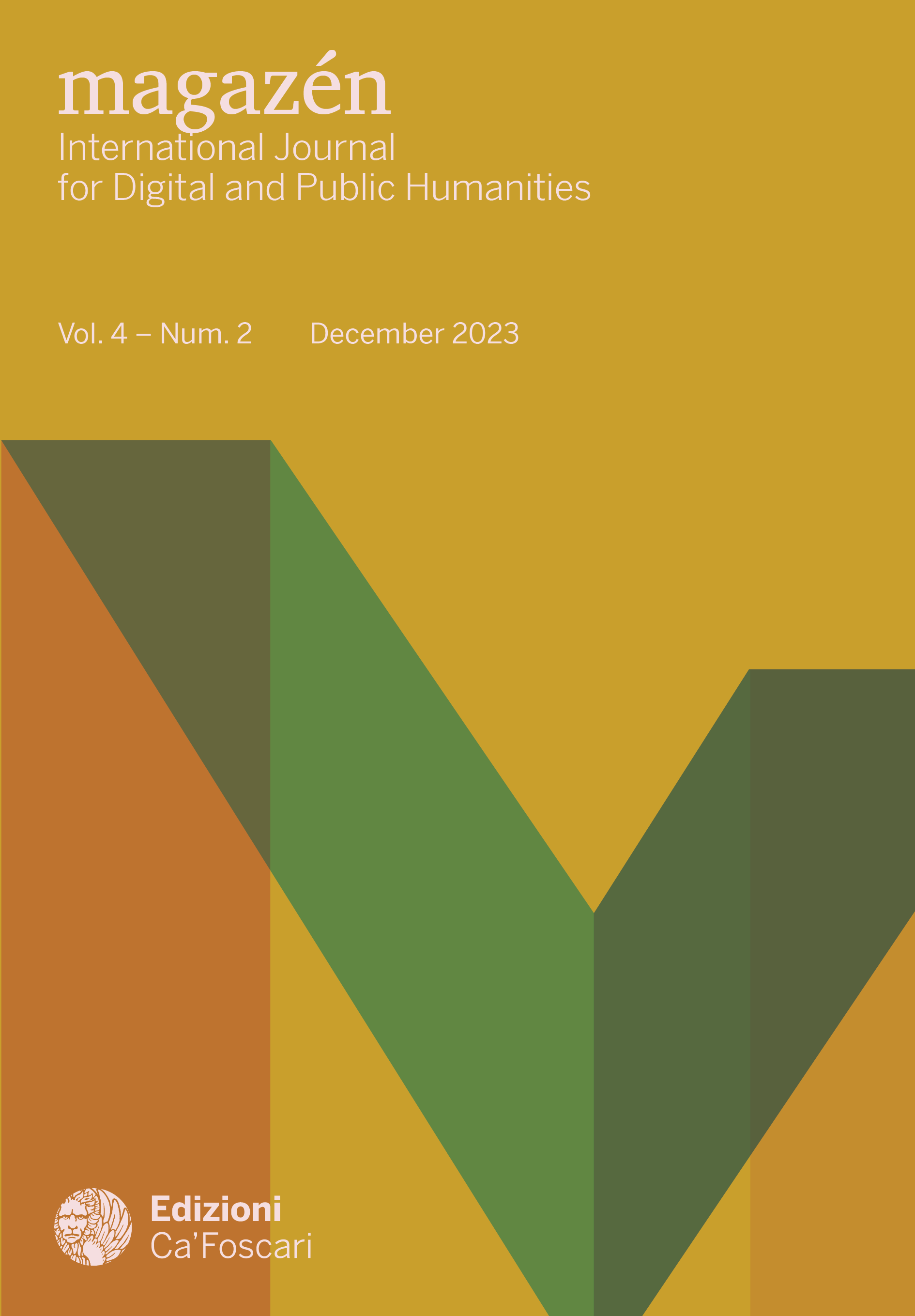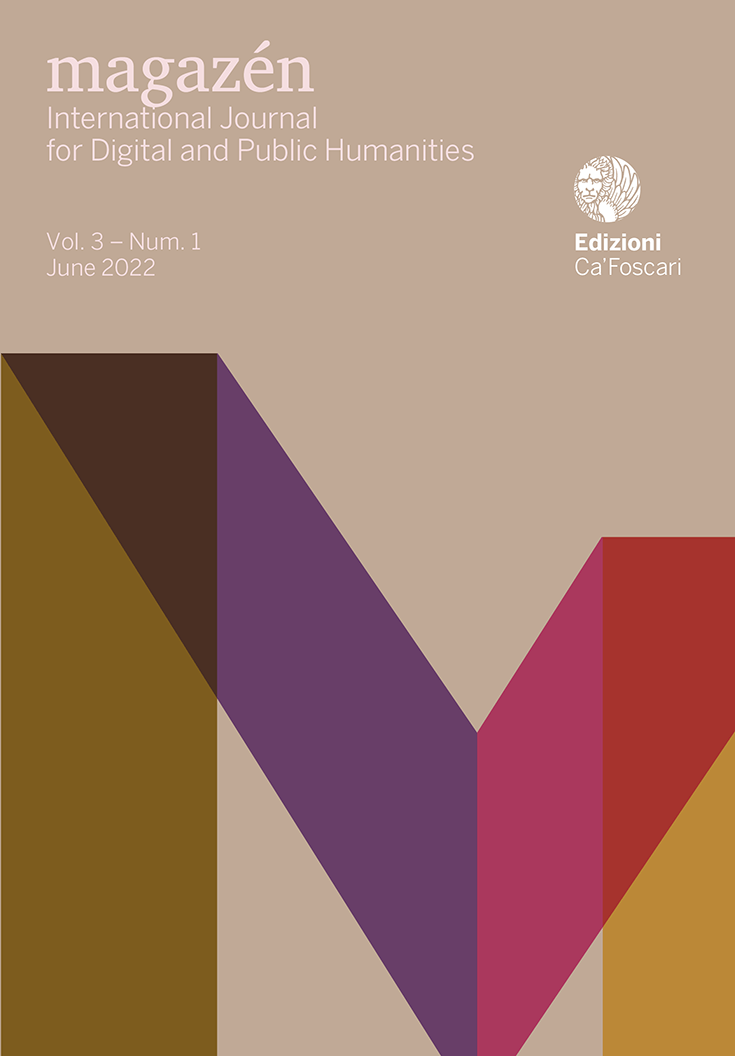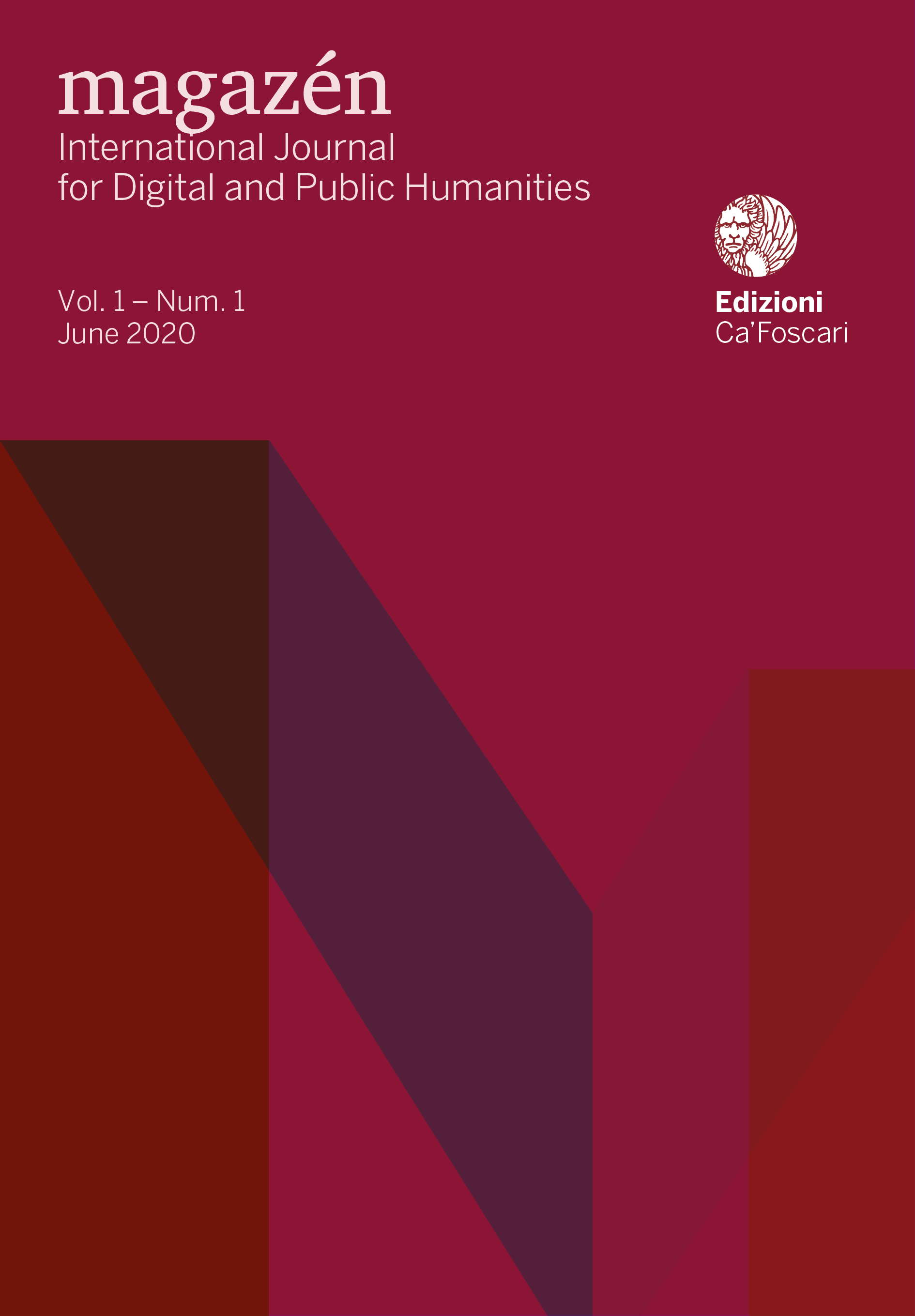Ethical Code of magazén. International Journal for Digital and Public Humanities
magazén. International Journal for Digital and Public Humanities is a peer-reviewed scientific journal whose policy is inspired by the COPE (Committee on Publication Ethics) Ethical Code. See the Best Practice Guidelines for Journal Editors.
Publisher’s responsibilities
The Publisher must provide the Journal with adequate resources and the guidance of experts, in order to carry out its role in the most professional way, aiming at the highest quality standard.
The Publisher must have a written agreement that defines the relationship with the owner of the Journal and/or the Editor-in-Chief. The agreement must comply with the Code of Behavior for Publishers of Scientific Journals, as established by COPE.
The relationship among the Editor-in-Chief, the Advisory Board and the Publisher is based on the principle of publishing independence.
Editors’ responsibilities
The Editor-in-Chief and the Advisory Board of magazén alone are responsible for the decision to publish the articles submitted.
Submitted articles, after having been checked for plagiarism by means of the anti-plagiarism software Compilatio that is used by the University and is made available to us, will be sent to at least two reviewers. Final acceptance presumes the implementation of possible amendments, as required by the reviewers and under the supervision of the magazén Editor-in-Chief.
The magazén Editor-in-Chief and Advisory Board must evaluate each submitted paper in compliance with the Journalʼs policy, i.e. exclusively on the basis of its scientific content, without discrimination of race, sex, gender, creed, ethnic origin, citizenship, or the scientific, academic and political position of the Authors.
Allegations of misconduct
If the magazén Editor-in-Chief and Advisory Board notice (or receive notifications of) mistakes or inaccuracies, conflict of interest or plagiarism in a published article, they will immediately warn the Author and the Publisher and will undertake the necessary actions to resolve the issue. They will do their best to correct the published content whenever they are informed that it contains scientific errors or that the authors have committed unethical or illegal acts in connection with their published work. If necessary, they will withdraw the article or publish a recantation.
All complaints are handled in accordance with the guidelines published by the COPE.
Concerns and complaints must be addressed to the following e-mail ecf_support@unive.it. The letter should contain the following information:
- complainant’s personal information;
- title, author(s), publication date, DOI;
- complaint(s);
- declaration that the complainant has no conflict of interest, or declaration of an actual or potential conflict of interest.
Authors’ responsibilities
Stylesheet
Authors must follow the Guidelines for Authors to be downloaded from the magazén website.
No multiple submissions
Authors must explicitly state that their work is original in all its parts and that the submitted paper has not been previously published, nor submitted to other journals, until the entire evaluation process is completed. Since no paper gets published without significant revision, earlier dissemination in conference proceedings or working papers does not preclude consideration for publication, but Authors are expected to fully disclose publication/dissemination of the material in other closely related publications, so that the overlap can be evaluated by the magazén Editor-in-Chief.
Authorship
Authors are strongly encouraged to use their ORCID iD when submitting a manuscript. This will ensure the authors’ visibility and correct citation of their work.
Authorship must be correctly attributed; all those who have given a substantial contribution to the design, organisation and accomplishment of the research the article is based on, must be indicated as Co-Authors. Please ensure that: the order of the author names is correct; the names of all authors are present and correctly spelled, and that affiliations are up-to-date.
The respective roles of each co-author should be described in a footnote. The statement that all authors have approved the final version should be included in the disclosure.
Conflicts of interest and financing
Authors, under their own responsibility, must avoid any conflict of interest affecting the results obtained or the interpretations suggested. The magazén Editor-in-Chief will give serious and careful consideration to suggestions of cases in which, due to possible conflict of interest, an Author’s work should not be reviewed by a specific scholar. Authors should indicate any financing agency or the project the article stems from.
Quotations
Authors must see to it that all works consulted be properly quoted. If works or words of others are used, they have to be properly paraphrased or duly quoted. Quotations between “double quotes” (or «angled quotation marks» if the text is written in a language other than English) must reproduce the exact wording of the source; under their own responsibility, Authors should carefully refrain from disguising a restyling of the source’s wording, as though it was the original formulation.
Any form of excessive, inappropriate or unnecessary self-citation, as well as any other form of citation manipulation, are strongly discouraged.
Ethical Committee
Whenever required, the research protocols must be authorised in advance by the Ethical Committee of Ca’ Foscari University of Venice.
Emendations
When Authors find a mistake or an inaccuracy in their own article, they must immediately warn the magazén Editor-in-Chief, providing all the information needed to make the due adjustments.
Reviewers’ responsibilities
Goal
By means of the peer-review procedure, reviewers assist the magazén Editor-in-Chief and Advisory Board in taking decisions on the articles submitted. They are expected to offer the Authors suggestions as to possible adjustments aimed at improving their contribution submission.
Timing and conflicts of interest
If a reviewer does not feel up to the task of doing a given review, or if she/he is unable to read the work within the agreed schedule, she/he should notify the magazén Editor-in-Chief. Reviewers must not accept articles for which there is a conflict of interest due to previous contributions or to a competition with a disclosed author (or with an author they believe to have identified).
Confidentiality
The content of the reviewed work must be considered confidential and must not be used without explicit authorisation by the Author, who is to be contacted via the editor-in-chief. Any confidential information obtained during the peer review process should not be used for other purposes.
Collaborative attitude
Reviewers should see themselves not as adversaries but as advocates for the field. Any comment must be done in a collaborative way and from an objective point of view. Reviewers should clearly motivate their comments and keep in mind the Golden Rule of Reviewing: “Review for others as you would have others review for you”.
Plagiarism
Reviewers should report any similarity or overlapping of the work under analysis with other works known to them.















